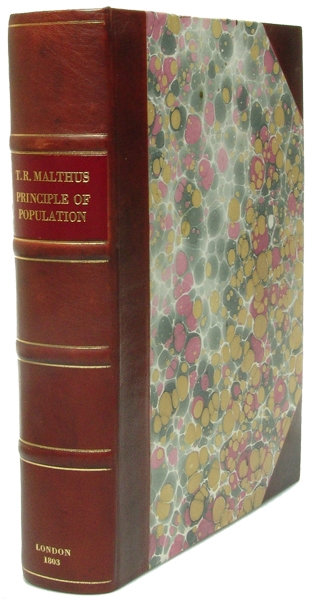POPULATION AND SUBSISTENCE
MALTHUS, T.R.
An Essay on the Principle of Population; or, a View of its Past and Present Effects on Human Happiness; with an Inquiry into our Prospects Respecting the Future Removal or Mitigation of the Evils which it Occations. A New Edition, very much Enlarged.
London, Printed for J. Johnson, by T. Bensley, 1803.
Large 4to. Later brown hcalf w. four raised bands, single gilt lines and red leather title-label on back. First three and last 14 leaves a bit brownspotted, t-p. and last two leaves marginally repaired at hinge, otherwise a very nice, clean and solid copy. VIII, (4), 610 pp.
The Great Quarto-edition, being the second edition of this first and most influential book on population. The work was first printed anonymously in 1798. This edition, though being the second, may be considered as a new work, which Malthus himself also claimed; -it is thoroughly revised and much enlarged (nearly four times the length of the original essay), the title has been changed (the title of the first is merely: "An Essay on the Principle of Population, as it Affects the Future Improvement of Society with Remarks on the Speculation of Mr. Godwin, M. Condorcet, and Other Writers"), and with this edition, Malthus does accept authorship of the work (by not publishing it anonymously). All the later editions were minor revisions of this second one. "In the course of this inquiry, I found that much more had been done, than I had been aware of, when I first published the essay. The poverty and misery arising from a too rapid increase of population, had been distinctly seen, and the most violent remedies proposed, so long ago as the times of Plato and Aristotle. And of late years, the subject had been treated in such a manner, by some of the French economists, occasionally by Montesquieu, and, among our own writers, by Dr. Franklin, Sir James Steuart, Mr. Arthur Young, and Mr. Townsend, as to create a natural surprise, that it had not excited more of the publick attention" (Preface to the second edition, p. IV).
The controversial views, because of which the work became so influential, are most provocative and eyeopening in the second edition, in which he for instance for the first time advocates moral restraint (meaning sexual abstinence and late marriage) and elaborately explains his comparison between the increase of population and food. "The "Essay" was highly influential in the progress of thought in the early nineteenth-century Europe.... "Parson" Malthus, as Cobbett dubbed him, was for many, a monster and his views were often grossly misinterpreted.... But his influence on social policy, whether for good or evil, was considerable. The Malthusian theory of population came at the right time to harden the existing feeling against the Poor Laws and Malthus was a leading spirit behind the Poor Law Amendment Act of 1834." (PMM 251).
Thomas Robert Malthus (1766-1834), called the "enfant terrible" of the economists, was an English demographer, statistician and political economist, who is best known for his groundbreaking views on population growth, presented in his "Essays on the Principle of Population", which is based on his own prediction that population would outrun food supply, causing poverty and starvation. Among other things this caused the legislation, which lowered the population of the poor in England. Malthus actually turned political, economic and social thought upside down with this work, which has caused him to be considered one of the 100 most influential persons in history (Hart, The 100: A Ranking of the most Influential Persons in History, 1978). Of course, he was condemned by Marx and Engels, and opposed by the socialists universally, but the work was of immense impact on not only politics, economics, social sciences etc, but also on natural sciences. For instance both Darwin and Wallace considered Malthus a main source in their development of the theory of natural selection, quoting him as being a great philosopher and his Essay on Population as being one of the most important books ever. "Malthus’s idea of man’s "Struggle for existence" had decisive influence on Charles Darwin and the theory of evolution. Other scientists related this idea to plants and animals which helped to define a piece of the evolutionary puzzle. This struggle for existence of all creatures is the catalyst by which natural selection produces the "survival of the fittest"... Thanks to Malthus, Darwin recognised the significance of intraspecies competition between populations of the same species (e.g. the lamb and the lamb), not just interspecies competition between species (e.g. the lion and the lamb). Malthusian population thinking also explained how an incipient species could become a full-blown species in a very short timeframe." (Wikipedia).
The second edition must be considered the most important of all the editions. This is far more a work on the problems of over-population than it is a response to Godwin and Condorcet on their works (as is mainly the first edition). "Not so much shocked by his own conclusions, in his "Essay on Population" (first ed. 1798), as driven by a naturally inquiring mind, he travelled for three years through Europe gleaning statistics and then published a second edition (1803)." (Catlin, A History of the Political Philosophers, 1939, p. 377). Printing and the Mind of Man 251 (first edition).
Order-nr.: 31325


